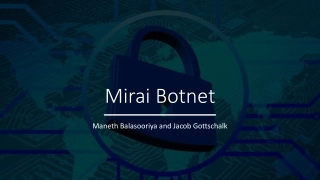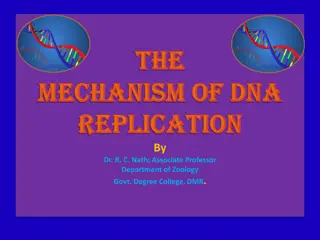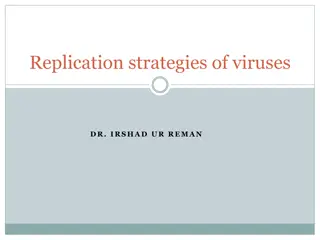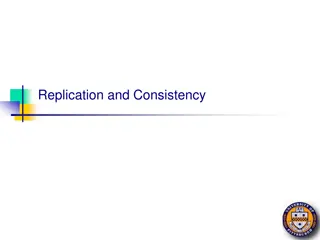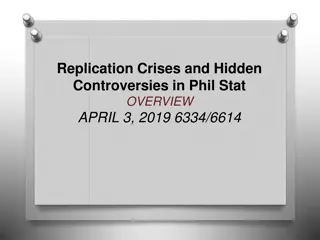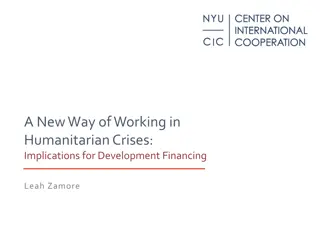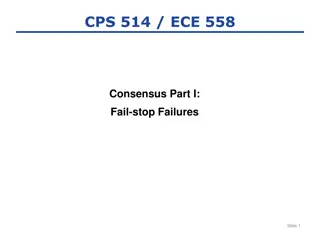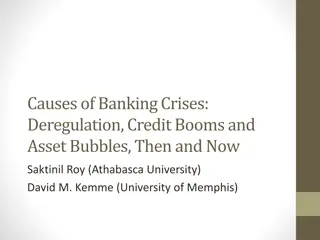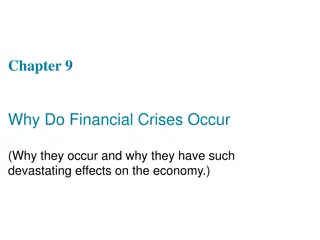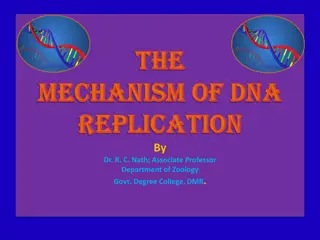Data Director Replication Best Practices
Explore best practices in data replication using methods like SQL, Web Services, and SaaS architecture. Learn about distribution, security, and central versions. Gain insights into replication processes and strategies.
1 views • 62 slides
Dismissive Reviews, Citation Cartels, and the Replication Crisis
The study delves into the replication crisis in research, citing factors influencing research credibility such as sample size, effect size, and financial interests. It highlights issues like gaming the system, P-hacking, and data sharing reluctance. The growth of Metascience as a response to these c
0 views • 45 slides
Mirai Botnet
The Mirai Botnet, created by Maneth Balasooriya and Jacob Gottschalk, is a notorious IoT botnet known for Distributed Denial-of-Service attacks on devices like IP cameras and DVRs. It originated from a Minecraft server protection racket and has been involved in major incidents. The botnet operates v
1 views • 8 slides
Understanding Viral Vectors in Gene Delivery: Safety and Considerations
Exploring the mechanisms of gene delivery via viral vectors, this content delves into the basics of viral structure, infection, and replication. It discusses common viral vector systems like Adenoviral and Lentiviral vectors, highlighting safety considerations and the production processes involved.
1 views • 19 slides
Understanding the Mechanism of DNA Replication
Explore the intricate process of DNA replication, as elucidated by renowned scientists like Dr. R. C. Nath and Nobel laureate Arthur Kornberg. Delve into the essential enzymes, proteins, and basic rules involved in the replication of genetic material, shedding light on initiation, elongation, and te
3 views • 22 slides
Ultimate Guide: How to Prepare for Hitachi Vantara HQT-6713 Certification
Start Here--- \/\/bit.ly\/3UEhsvm ---Get complete detail on HQT-6713 exam guide to crack Hitachi Vantara Qualified Professional - In-system replication management. You can collect all information on HQT-6713 tutorial, practice test, books, study material, exam questions, and syllabus. Firm your know
2 views • 17 slides
The Origin of Viruses: Theories and Evidence
Viruses are acellular parasites with a complex replication mechanism. Studies on their origin present challenges due to the lack of fossils. Three main hypotheses include regressive, cellular origin, and co-evolution. The regressive hypothesis suggests viruses originated from complex ancestors that
2 views • 25 slides
Understanding DNA Replication Process: Insights and Mechanisms
DNA replication is a crucial biological process where identical copies of DNA molecules are produced for cell division. Initiated by specific proteins, it involves stages like initiation, elongation, and termination. Enzymes like helicases and DNA polymerase play key roles in forming replication for
0 views • 33 slides
Understanding DNA Replication in Prokaryotes for B.Sc. Botany Hons. Students
Study material on DNA replication in prokaryotes focusing on key concepts like semiconservative mode of replication, involvement of enzymes, different models for understanding replication, and the bidirectional nature of DNA replication in prokaryotes. The material covers the process steps including
0 views • 33 slides
Plant Mitochondrial and Chloroplast DNA Replication Mechanisms
Plant mitochondria and chloroplasts have intricate DNA replication processes. Mitochondrial DNA replication is independent of the plant cell cycle and is associated with specific proteins in nucleoid complexes. Plant mtDNA contains more genes than animal mtDNA, with a complex structure involving int
1 views • 16 slides
Viral Genome Replication Strategies and Mechanisms
Viruses utilize different replication strategies to ensure the replication of viral genomes, packaging into virions, and potentially altering the host cell's structure or function. These strategies are vital for the virus to operate effectively within the host cell's constraints. The replication pro
0 views • 15 slides
Insights from Evaluation of Previous Humanitarian Crises and Core Humanitarian Standards
Evaluation of past crises reveals the importance of core humanitarian standards in providing timely, coordinated, and effective assistance. Learning from experience, feedback mechanisms, and competent staff are key for addressing humanitarian crises. Data and systems play a crucial role in monitorin
0 views • 13 slides
Understanding Replication and Consistency in Computer Systems
Explore the concepts of replication and consistency in computer systems, discussing the benefits and challenges of using replicas for reliability, performance, and scalability. Learn about object replication problems and solutions, and the importance of maintaining consistency in shared data access.
1 views • 26 slides
Addressing Replication Crises and Hidden Controversies in Phil.Stat
High-profile failures of replication have sparked debates on reforming statistical methods in science. Hidden controversies include Statistics Wars, Replication Paradoxes, and underlying assumptions. Significance tests and p-values play crucial roles, but proper interpretation is essential to avoid
0 views • 48 slides
Understanding Chain Replication for High Throughput Object Storage
Chain replication is a technique used to achieve high throughput and scalability in object storage systems. It ensures strong consistency by maintaining replicas of data across a chain of nodes, enabling efficient read-mostly workloads. The approach simplifies programming complexity and enhances sys
0 views • 28 slides
Management Strategies for Crisis in Tourism Industry
Explore the crucial role of crisis management in the tourism sector, understanding how internal and external shocks impact the industry. Discover the ripple effects of crises on a global scale and delve into various approaches to studying and managing crises effectively. Gain insights into the lifec
0 views • 9 slides
Innovative Approaches in Humanitarian Crises and Development Financing
This study explores the New Way of Working in humanitarian crises, focusing on reinforcing national systems, anticipating crises, and transcending humanitarian-development divides. Promising trends include rising government ownership and increased linkages between humanitarian activities and governm
0 views • 6 slides
Raft Consensus Algorithm Overview
Raft is a consensus algorithm designed for fault-tolerant replication of logs in distributed systems. It ensures that multiple servers maintain identical states for fault tolerance in various services like file systems, databases, and key-value stores. Raft employs a leader-based approach where one
0 views • 34 slides
Analysis of Banking Crises: Deregulation, Credit Booms, and Global Impacts
This study delves into the causes and patterns of banking crises, focusing on deregulation, credit booms, and asset bubbles. It compares the global financial crisis of 2008-2009 with historical crises worldwide, highlighting common factors leading to such events. The research discusses the role of l
0 views • 23 slides
Understanding Financial Crises and Their Impacts
Financial crises arise due to disruptions in financial markets, leading to severe economic consequences. This text delves into the definition, stages, causes, and effects of financial crises, with a focus on the global financial crisis of 2007-2009 and the European Sovereign Debt Crisis. It also dis
0 views • 28 slides
Gender Equality in Humanitarian Crises: Empowering Women and Girls
Addressing gender equality in humanitarian crises is crucial for empowering women and girls. Access and participation in facilities and activities, meaningful participation, dignity, and empowerment are key aspects to consider. Women's empowerment spans various spheres and requires holistic approach
0 views • 33 slides
Low-Latency Inter-Datacenter State Machine Replication Using Clock-RSM
Clock-RSM introduces a low-latency approach to inter-datacenter state machine replication by utilizing loosely synchronized physical clocks. This method ensures strong consistency, fault tolerance, and fast failover in a geo-replication environment. By overlapping ordering and replication using phys
0 views • 29 slides
Differences Between DNA Replication and RNA Transcription
This content discusses the general variances between DNA replication and RNA transcription, highlighting their purposes, processes, enzymes involved, timing, and more. It delves into the initiation, template, and involved areas of replication and transcription, as well as key DNA regions like promot
0 views • 24 slides
Understanding DNA Replication and Genetic Transcription
Explore the fundamental concepts of molecular biology focusing on DNA replication, transcription of genetic material into mRNA, and translation into functional proteins. Learn about the semiconservative nature of Eukaryotic DNA replication, the proteins involved, steps in the replication process, an
0 views • 25 slides
Understanding DNA Replication: Models and Process Overview
DNA replication is a fundamental process where the DNA molecule unwinds and two new daughter strands are synthesized based on base-pairing rules. Three models - conservative, semiconservative, and dispersive - explain how DNA replication occurs, with each model having specific characteristics. Enzym
0 views • 22 slides
Managing Life-Threatening Crises in Energy Assistance Programs
This document outlines statutory requirements, intervention concepts, crisis components, definitions of crisis and life-threatening crises, and the process of applying for crisis assistance in energy-related emergencies. Grantees must act promptly to resolve crises within specific timeframes, ensuri
0 views • 17 slides
Predicting Food Crises: A Comprehensive Analysis
Food insecurity is a significant issue, especially in developing regions like Africa, exacerbated by factors such as climate change and population growth. Despite the importance of early prevention, there is limited literature on predicting food crises, unlike conflict outbreaks. This study by Bo An
0 views • 15 slides
Understanding DNA Structure and Replication
Discover the key aspects of DNA, including its structure as a nucleic acid polymer composed of nucleotides and the process of DNA replication. Learn about the double helix structure, base pairing rules, and the semi-conservative replication mechanism. Explore how DNA is synthesized in a 5 to 3 direc
0 views • 18 slides
Understanding DNA Replication Process in Living Organisms
DNA replication is a fundamental biological process where an original DNA molecule produces two identical copies. This process involves initiation, elongation, and termination stages, utilizing replicator and initiator proteins. The DNA is unwound and replicated with the help of enzymes like helicas
0 views • 16 slides
Impact of Banking Crises on the Real Economy: Lessons from History
Understanding the influence of banking crises on the real economy, particularly during the Great Depression, where massive bank suspensions triggered economic turmoil. The interplay between banking panics, monetary deflation, bank failures, loss of credit information, and debt deflation worsened the
0 views • 55 slides
Causal Relationships in Replication Systems
In this piece, we explore various aspects of causal relationships within replication systems such as the significance of logical and vector clocks, updates propagation in systems like Bayou, and commitment to learning order in asynchronous replication systems. Through analyzing scenarios and stateme
0 views • 8 slides
Cuba and Venezuela: Contemporary Crises Analysis
Analyzing the contemporary crises in Cuba and Venezuela, this study delves into the deep-rooted issues affecting both countries. From economic struggles to demographic challenges and political alliances, the research highlights the key factors contributing to the crises. Despite attempts at reforms
0 views • 35 slides
Understanding DNA Replication: From Basics to Lab Synthesis
DNA replication is a fundamental process in all living organisms, essential for biological inheritance. This comprehensive guide explores the stages of DNA replication, highlighting key experiments and differences between prokaryotic and eukaryotic replication. Additionally, it delves into the revol
1 views • 31 slides
Understanding DNA Replication: Process and Significance
DNA replication is a fundamental process in all living organisms, crucial for genetic inheritance. This article covers the stages of DNA replication, including initiation, elongation, and termination. It discusses important concepts such as semi-conservative replication, proofreading mechanisms, and
0 views • 29 slides
Understanding the Euro Crisis: Interrelated Challenges and Strategies
The Euro crisis, analyzed through government bond yields, interrelated crises (sovereign debt, bank, growth, and competitiveness crises), government debt dynamics, and strategies to tackle sovereign debt crises with rescue loans and fiscal austerity conditions. The interconnected nature of the crise
0 views • 20 slides
Understanding DNA Structure, Replication, and Proofreading
Exploring the intricate world of DNA, this module delves into the structure of DNA, highlighting nucleotides, nitrogenous bases, and the double helix. It emphasizes how DNA stores genetic information in genes and undergoes replication through a semi-conservative model. The process of DNA replication
0 views • 13 slides
Understanding DNA Replication: Concepts and Mechanisms Explored
Delve into the intricate process of DNA replication, as elucidated by Dr. R. C. Nath and other renowned scientists. Explore the fundamental principles such as semi-conservative replication, origin of replication, and the roles of essential enzymes like DNA polymerase. Uncover the core proteins invol
0 views • 22 slides
Analysis of Banking Losses During Crises: Charts in Staff Memo 3/2014
This collection of charts depicts the losses incurred by banks during crises in various sectors such as households, building, construction, and non-financial enterprises in different countries like Norway, the United Kingdom, and Iceland over different time periods. The data includes write-downs and
0 views • 11 slides
Understanding DNA and DNA Replication: Key Concepts with Visual Aids
Explore essential terms related to DNA and DNA replication, including chromosomes, genes, nucleotides, double helix structure, hydrogen bonds, and more. Discover the process of DNA replication, involving enzymes like DNA polymerase and helicase, and the concept of semi-conservative replication. Rein
0 views • 13 slides
Insights into DNA Replication and Chromosome Structure
DNA replication is a fundamental process vital for the transmission of genetic information. Chromosomes, composed of DNA-protein complexes, store genetic information, and replication involves the synthesis of new DNA molecules. Enzymes play crucial roles in DNA synthesis, and in E. coli cells, repli
0 views • 16 slides


